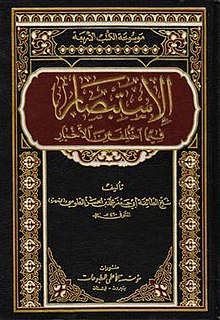


Front cover of Al-Istibsar
| |
| Author | Shaykh Tusi |
|---|---|
| Language | Arabic |
| Media type | Book |
| Part of a seriesonShia Islam |
| Twelver Shi'ism |
|---|
|
|
|
Other beliefs |
|
|
|
Other practices |
|
Holy cities |
|
Groups |
|
Other related sects and groups |
|
Scholarship |
|
Hadith collections
|
|
Sources of ijtihad and jurisprudence |
|
Related topics |
|
|
|
|
al-Istibsar (Arabic: ٱلِٱسْتِبْصَار فِيمَا ٱخْتُلِفَ مِن ٱلْأَخْبَار, romanized: al-Istibṣār fī-mā ukhtulifa min al-Akhbār, lit. 'Reflection Upon The Disputed Traditions') is the fourth hadith collection of the Four BooksofShia Islam. it was compiled by Persian scholar al-Tusi It includes the same subjects as Tahdhib al-Ahkam (Rectification of the Statutes) but in a shorter form.[1]
Al-Tusi lived during the first half of the 5th century AH. He is the best known jurist and Mujtahid of the Shia. Born in Tus in 385 AH, he lived his early life there. He received primary education in his homeland of Iran, and had higher studies in Baghdad. At the time Baghdad was the seat of the Abbasid Caliphate and a great center of learning. Abbaside rule stretched from Spain and south Arabia to China and from the Mediterranean coast to North Africa. Consequently, Baghdad was a seat of learning and meeting point for scholars and intellectuals from all parts of the world. The greatest personality of this period was al-Shaykh al-Mufid who resided in the Shia neighborhood of Karkh in an opulent atmosphere.[2]
Shaykh al-Tusi taught the teachings of Islam in the presence of the great masters such as Shaykh al-Mufid, Sharif al-Murtaza,[3] Ibn Ghada’iri, and ibn Abdun.[4]
Two authoritative Shia resources, Tahdhib al-Ahkam and Al-Istibsar, were written by Shaykh al-Tusi. He also authored many works such as Talkhis al-Shafi, al-Muqni fi ‘l-ghayba, al-Ghayba,[5] al-Tibyan fi Tafsir al-Quran, al-Khilaf, al-Mabsut fi fiqh al-Imamiyah.[6]
Sayyid Murtada Alam al-Huda (Sharif al-Murtaza) wrote some works on an Imamate called al-Shafi. It was written as a response to the section on Imamte of Mutazili Qadi Abd al-Jabbar’s al- Mughni. This work summarized by Shaykh al-Tusi that was titled Talkhis al-Shafi.[3]
Al-Istibsar is one of the four major Shia collections of Hadith authored by Shaykh Tusi.[7] He authored this book after writing Tahdhib al-Ahkam, when his colleagues asked him to summarize the book and determined traditions which disagree and explain the reconciliation between the two without leaving out anything which was influential.[8]
He wrote in the introduction of Al-Istibsar:
It would be useful that there should be a reference (madhkur) book which a beginner could use in his study of jurisprudence, or one who has finished, to remind himself, or the intermediate (student) to study more deeply. Thus (so that) all of them could obtain what they need and reach their soul's desire, what is connected with different traditions would be set in an abridged way. Therefore they asked me to summarize it (Tahdhib al-Ahkam) and devote care to its compilation and abridgement, and to begin each section with an introduction about what I relied on for the legal decisions and traditions in it; then I should follow with those traditions which disagree and explain the reconciliation between the two without leaving out anything which was influential.
It does not include many traditions and explanations are brief.[8]
Al-Istibsar is authored about Hadiths that seemingly are at variance with each other or "show discrepancies" in their contents. It included three parts. The first two parts are about Worship (except Jihad) and the last part is allocated to subjects of jurisprudence. The first part includes 300 chapters with 1899 Hadiths. The second part has 270 chapters with 1177 Hadiths and the last part included 398 chapters with 2455 Haithes. To avoid distortion, Shaykh Tusi determined number of Hadiths in the book exactly. Al-Istibsar included 5511 Hadiths. In specific print of book, 5558 Hadiths have been reported that is caused by manner of counting.[9]
Many Shiite scholars have written explanations for Al-Istibsar, including the following:[10]
{{cite book}}: |website= ignored (help)
|
| |
|---|---|
| Kutub Al-Arb'ah |
|
| Other primary hadith collections |
|
| Secondary books of Hadith |
|
| Biographical evaluation |
|